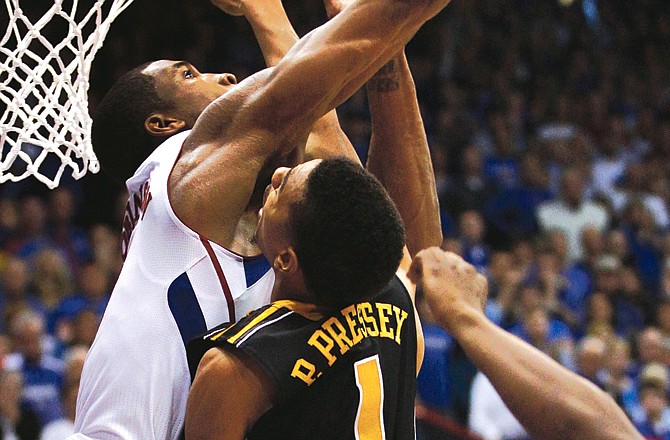LAWRENCE, Kan. (AP) - Capturing the mood as well as anyone on this historic day was the student who came dressed as John Brown.
Decked out in 19th-century garb and with a thick beard dyed gray, Brian Duerksen did look eerily like the famed Kansas abolitionist as he held trophies symbolizing Kansas' 2008 Orange Bowl triumph in one hand and 2008 NCAA basketball championship in the other and struck a magisterial pose.
It was, after all, the slavery issue that tore the nation apart in the 1860s and sparked hatred and violence along the Kansas-Missouri border, helping to create one of the most unique collegiate rivalries this country has ever seen.
As the mayhem came to a boil, anti-slavery Kansans calling themselves Jayhawkers nearly destroyed the little town of Osceola, Mo., getting away before the pro-slavery militia known as the Missouri Tigers could ride to its defense.
In retaliation for that atrocity and others, William Quantrill's pro-slavery Raiders rode out of Missouri, murdered about 200 men and burned Lawrence to the ground.
After the Civil War put an end to slavery, Kansans and Missourians put down their guns, picked up footballs and basketballs and took out their animosity in less violent ways.
Conceived in blood and battle, their hot, spirited rivalry endured for more than a century. It survived two World Wars, Korea and Vietnam. It was alive the night the Titanic sank. It went on through Prohibition, the Great Depression, the Civil Rights movement and the destruction of the Twin Towers.
It was still going when Barack Obama became the first black man to be elected President of the United States.
In some sense, there's been no rivalry like it.
But now it is no more - unless the Tigers and Jayhawks meet again in the postseason. Missouri is headed to the Southeastern Conference next season and a bitter Kansas, feeling resentful and rejected, remains in a Big 12 that looked for a while as though it might fall apart.
With practically everybody in Kansas from coach Bill Self to Gov. Sam Brownback saying they have no interest in ever accepting Missouri's invitation to play as non-conference foes, everyone knew Saturday's game would probably be Missouri's last trip to Allen Fieldhouse.
Even before tipoff, the tradition-steeped building was rim-rattling loud, so noisy holding a conversation with anyone not right in your ear was nearly impossible.
There have been plenty of big games in the 56-year-old arena, famous for being one of the loudest venues in college basketball. But it may never have been so loud as in the final minutes when No. 4 Kansas, after erasing a 19-point second-half deficit, emerged with an 87-86 overtime win against No. 3 Missouri.
It was a bittersweet moment for fans on both sides of the divide.
Other rivalries such as Auburn-Alabama and Texas-Oklahoma have drawn more national headlines. But did Auburn ever ransack homes and burn crops in Tuscaloosa? Did the Oklahoma National Guard ever sneak across the Red River in the dead of night and sack Dallas?
"I think it's a crying shame we'll never play again in the regular season," said sophomore Gwen Wright, hoisting a sign in the student section that read: "Kansas 15 Final Fours, Missouri 0."
As sign-toting students and fans old enough to be their grandparents poured into Kansas' venerable gym, animosity, anger and nostalgia were in the air.
"I don't know if this is the biggest game ever in Allen Fieldhouse," said Max Falkenstein, whose 60-year broadcast career included the very first game in the fieldhouse in 1955 when Wilt Chamberlain scored 52 against Kansas State.
"But I can't think of a bigger one. I'd say this is the most emotional game ever here."
Kansas fans have always enjoyed knowing they held the moral high ground on the original issue that so violently separated the two states and love to brag about being to so many Final Fours while Missouri has never made it past the quarterfinals of the NCAA tournament.
But Missouri knows it was invited to join a bigger, richer conference while Kansas would have been left out in the cold if the Tigers' departure had led to the collapse of the Big 12.
"Missouri is the one that started this thing," Brownback said. "And now they're kind of going, "Oh, well, come on, can't we play?'" This has been very difficult for us. This is like a guy divorcing you and then saying, "Oh, say, can we still date?' I don't think so."
Said one sign, pointing to Kansas' lopsided advantage in the series: "171-95 - we see why you're leaving."
Said another: "We won't miss you."
But they probably will. Century-old rivalries take a long time to grow.

